
U.S. President Joe Biden at Intel Ocotillo Campus on March 20, 2024 in Chandler, Arizona.Photo: Rebecca Noble (Getty Images)
As generative artificial intelligence takes off and tensions between the U.S. and China rise, the Biden administration is making a multi-billion dollar effort to bring chipmaking back to the U.S.
President Joe Biden signed the bipartisan CHIPS and Science Act in 2022 to boost semiconductor manufacturing as well as research and development. The $280 billion package, which is not only focused on chips, includes $52 billion in subsidies for semiconductors. So far, over half of that has been allocated to chip designers and manufacturers in the U.S.
See which 12 companies have already received funding from the Chips Act, and how much they’ve gotten.

Intel CEO Pat Gelsinger at the Intel Ocotillo Campus on March 20, 2024 in Chandler, Arizona. Photo: Rebecca Noble (Getty Images)
Semiconductor pioneer Intel has received the largest amount of funding so far from the Chips Act, with $8.5 billion in direct government funding and $11 billion in federal loans. Intel plans to invest over $100 billion in the U.S. over the next five years to build chipmaking sites in Arizona, New Mexico, Ohio, and Oregon.
Intel said its investments are expected to create more than 10,000 jobs and about 20,000 construction jobs. Its plants will also support over 50,000 indirect jobs for suppliers and adjacent industries.
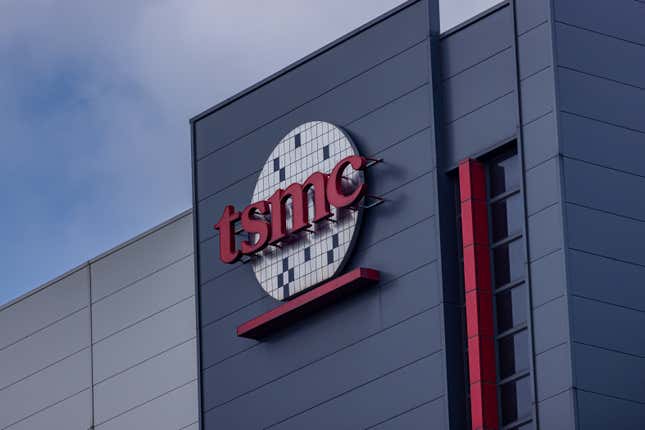
Taiwan Semiconductor Manufacturing Company (TSMC) at Hsinchu Science Park on September 16, 2022 in Hsinchu, Taiwan.Photo: Annabelle Chih (Getty Images)
Taiwan Semiconductor Manufacturing Company (TSMC) received $6.6 billion in grants and $5 billion in loans through the Chips Act to support its first major U.S. chipmaking hub in Phoenix, Arizona. The semiconductor foundry is responsible for most of the world’s advanced chips, and already has two chipmaking facilities in Arizona expected to begin production in 2025 and 2028. Some of the new funding will be used to build a third facility.
TSMC’s planned chipmaking hub in Phoenix will put the U.S. on track to produce 20% of the world’s advanced chips by 2030, the Biden administration said.
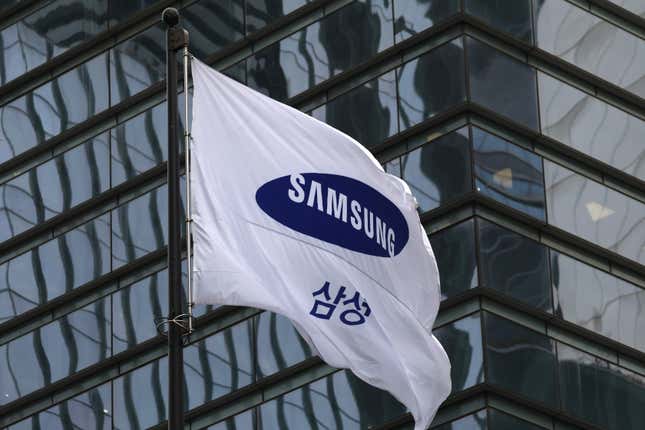
Photo: Chung Sung-Jun (Getty Images)
Major South Korean electronics company Samsung received $6.4 billion in direct funding under the Chips Act to support its more than $40 billion investment in its existing chip facility in Austin and planned chipmaking hub in Taylor, Texas.
The hub will focus on developing and producing advanced chips, research and development, and advanced packaging. With Samsung’s investment, the U.S. is on track to produce around 20% of the world’s advanced logic chips by the end of the decade, the Commerce Department said.
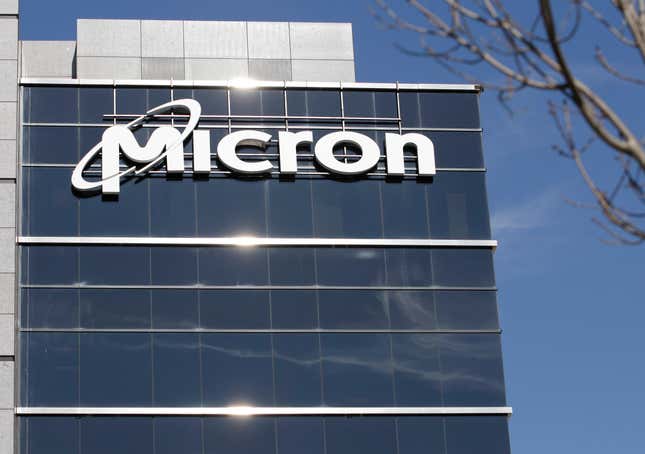
Photo: Paul Sakuma (AP)
Micron received $6.1 billion in Chips Act funds to build chip fabrication sites, or fabs, in central New York and Idaho. The federal funding is part of a $100 billion public-private investment over the next 20 years to build a “mega-fab project” to produce memory chips in central New York that is expected to create 50,000 jobs, Senate Majority Leader Chuck Schumer (D-N.Y.) has said. The New York portion of the funding will go toward construction of the first two of four fabs by the end of the decade, Schumer said.

Photo: GlobalFoundries
Semiconductor manufacturer and designer GlobalFoundries received $1.5 billion in Chips Act funding to support three projects. Part of the funding will go toward expanding GlobalFoundries’ chip fabrication facility, or fab, in Malta, New York by adding critical technology it already uses in Singapore and Germany for vehicles.
GlobalFoundries also plans to use the funding to build a new state-of-the-art fab on its Malta campus for essential chips that can be used for automotive, aerospace, defense, and artificial intelligence. The third project focuses on modernizing its “longest continuously operated fab” in Essex Junction, Vermont, and creating the first U.S.-based facility that can manufacture next-generation gallium nitride (GaN) semiconductors at a high volume for technologies including power grids and data centers.

Illustration: Pavlo Gonchar/SOPA Images/LightRocket (Getty Images)
Taiwanese silicon wafer-manufacturer GlobalWafers received $400 million in proposed funding from the Chips Act for projects in Sherman, Texas and St. Peters, Missouri. GlobalWafers will produce both standard silicon and specialized wafers needed for memory chips and chips for defense and aerospace uses, according to the Department of Commerce. The proposed Chips Act funding will support building new wafer manufacturing facilities, and is expected to create 1,700 construction jobs and 800 manufacturing jobs.
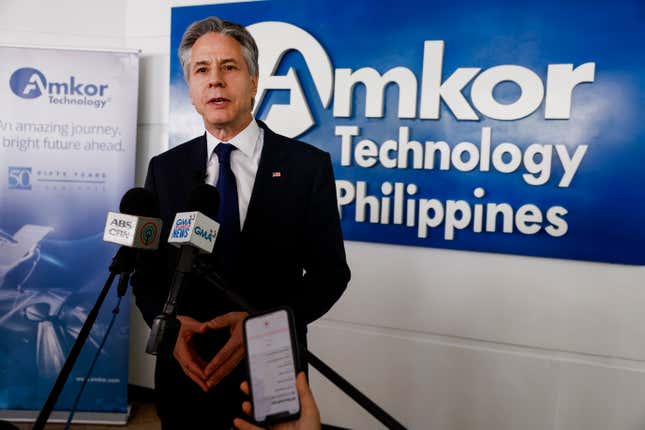
U.S. Secretary of State Antony Blinken during a tour of Amkor Technology in Manila, Philippines on March 19, 2024. Photo: Evelyn Hockstein/Pool Photo (AP)
Amkor Technology received $400 million in proposed direct funding under the Chips Act to support its investment of $2 billion into an end-to-end advanced chip packaging project in Peoria, Arizona. The facility is estimated to create 2,000 jobs. In addition to the proposed direct funding, Amkor received $200 million in proposed loans.
The advanced packaging and test facility is expected to package and test millions of chips that will be used in autonomous vehicles, 5G and 6G smartphones, and large-scale data centers, according to the Commerce Department. The facility will use 2.5D technology, which is a foundation for artificial intelligence chips, including GPUs, or graphics processing units.
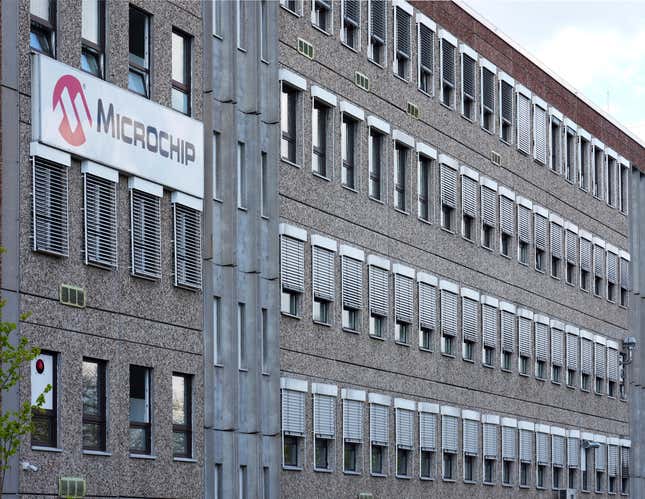
Photo: Soeren Stache/picture-alliance/dpa (AP)
Microchip Technology, which manufactures microcontroller, mixed-signal, analog, and Flash-IP integrated circuits, received $162 million from the Chips Act to support onshoring its semiconductor supply chain, the Commerce Department said. The Chips Act funding will help the company increase production of microcontroller units (MCUs) and other speciality semiconductors.
Microchip Technology’s MCUs and mature-node semiconductors are critical to the production and manufacturing of automotives, including electric vehicles, and tech such as cell phones and airplanes.

Photo: TRIPPLAAR KRISTOFFER/SIPA (AP)
American semiconductor manufacturer Polar Semiconductor received $120 million in federal funding from the Chips Act. The funding will help Polar Semiconductor expand its manufacturing facility in Bloomington, Minnesota, as well as its tech capabilities — both of which will help the company double its production capacity of sensor and power chips in the U.S. within two years, according to the Commerce Department.
The investment will also bring in more private capital from the U.S. to make it a majority U.S.-owned commercial foundry instead of a majority foreign-owned in-house manufacturer, the Commerce Department said.
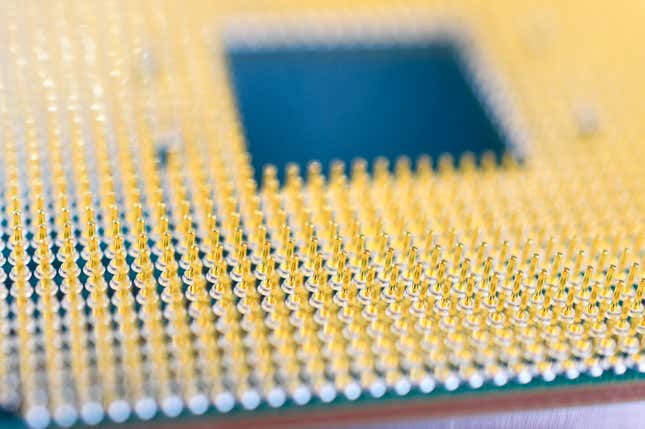
Photo: Borislav (Getty Images)
Absolics, an affiliate of Korea-based SKC, received $75 million in proposed direct funding from the Chips Act to build a 120,000 square-foot facility in Covington, Georgia. The company develops substrates technology that is used for semiconductor advanced packaging. The proposed Chips Act investment in Absolics is the first “in a commercial facility supporting the semiconductor supply chain by manufacturing a new advanced material,” according to the Commerce Department. The company’s glass substrates will be used as advanced packaging technology for AI chips.
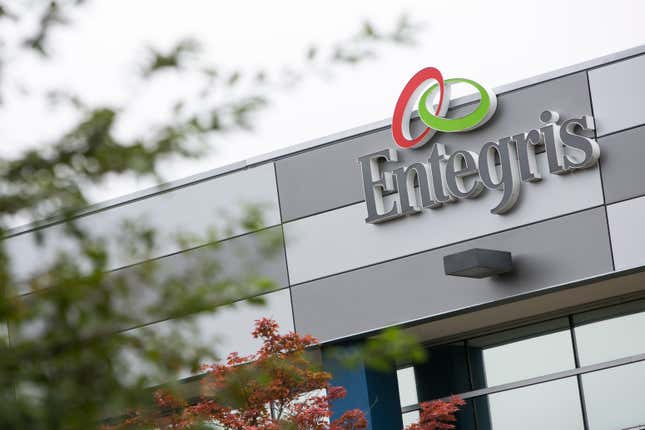
Photo: Sipa USA (AP)
Semiconductor material-supplier Entegris received $75 million in proposed federal incentives from the Chips Act. The proposed investment in Entegris “would onshore critical semiconductor supply chain and manufacturing materials for leading-edge chip production,” according to the Department of Commerce. It would support building a state-of-the-art manufacturing center in Colorado Springs, Colorado, and create around 600 direct manufacturing jobs, and 500 construction jobs by the end of the decade.

Photo: Luke Sharrett (Getty Images)
Aerospace and defense-tech company BAE Systems received $35 million in initial funding to modernize its Microelectronics Center (MEC) in Nashua, New Hampshire. It was the first company to receive funding from the Chips Act.
The funding will be part of an ongoing investment in BAE Systems’ modernization and research and development efforts. It will go toward purchasing new and efficient tools to improve its supply chain to meet increasing demand from the Department of Defense for technology, and non-defense industries such as satellite communications.

Photo: scorpp (Getty Images)
Rogue Valley Microdevices was the first women- and minority-owned chip company to receive funding from the Chips Act. The company, which received $6.7 million in proposed direct funding, is a pure play microelectromechanical system (MEMS) foundry, which means it works with companies which have a design and need a manufacturing partner to make a functional chip. The funding will support the construction of a MEMS and sensor foundry in Palm Bay, Florida.
“We’re really excited about the opportunity,” Rogue Valley Microdevices chief executive Jessica Gomez told Quartz. “Getting CHIPS funding for our project really means a lot to our ability to do this project quickly and get up and running so that we can continue to support our customers and their targets and growth strategy.”
>>> Read full article>>>
Copyright for syndicated content belongs to the linked Source : Quartz – https://qz.com/intel-tsmc-samsung-chips-science-act-semiconductors-1851538676










